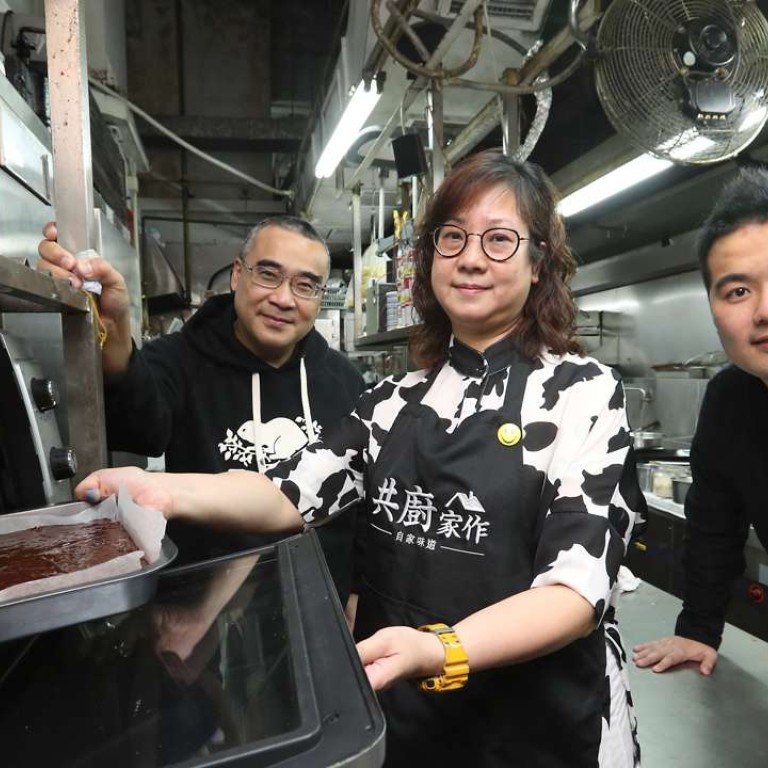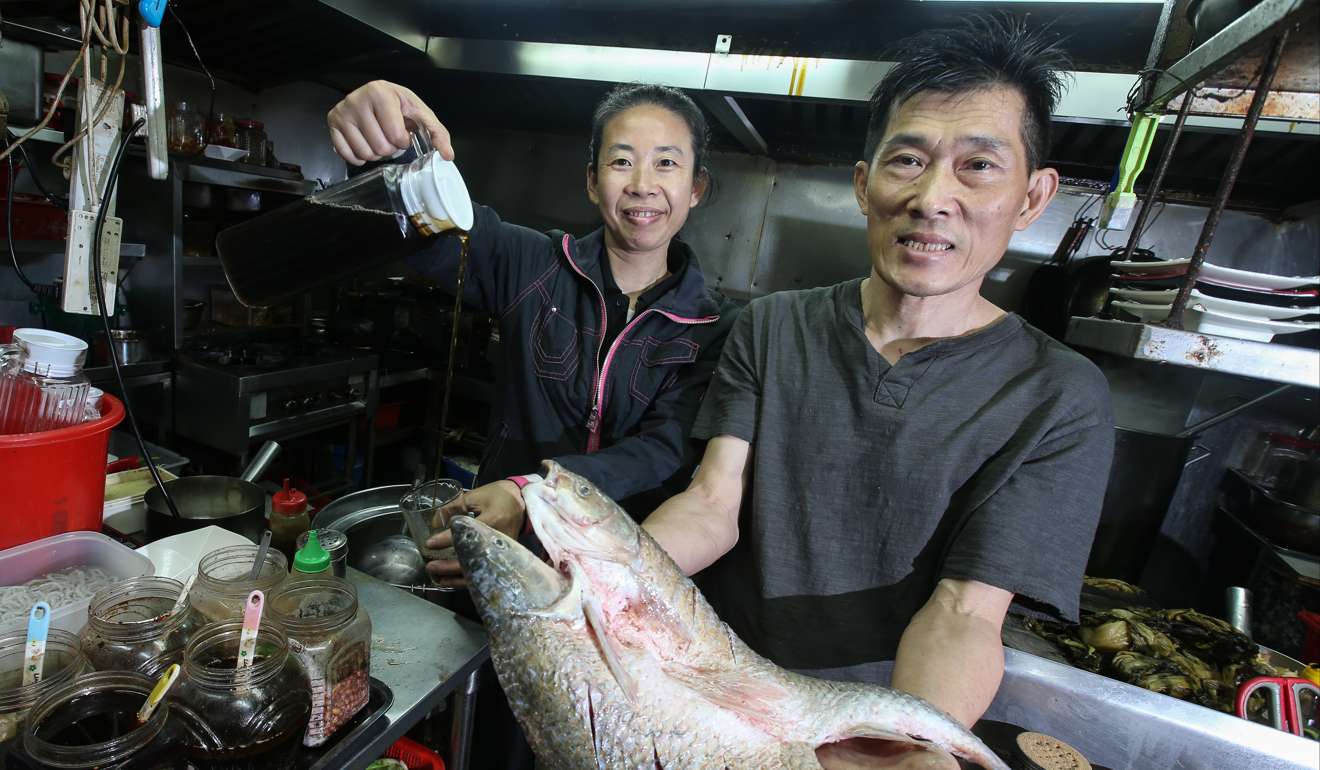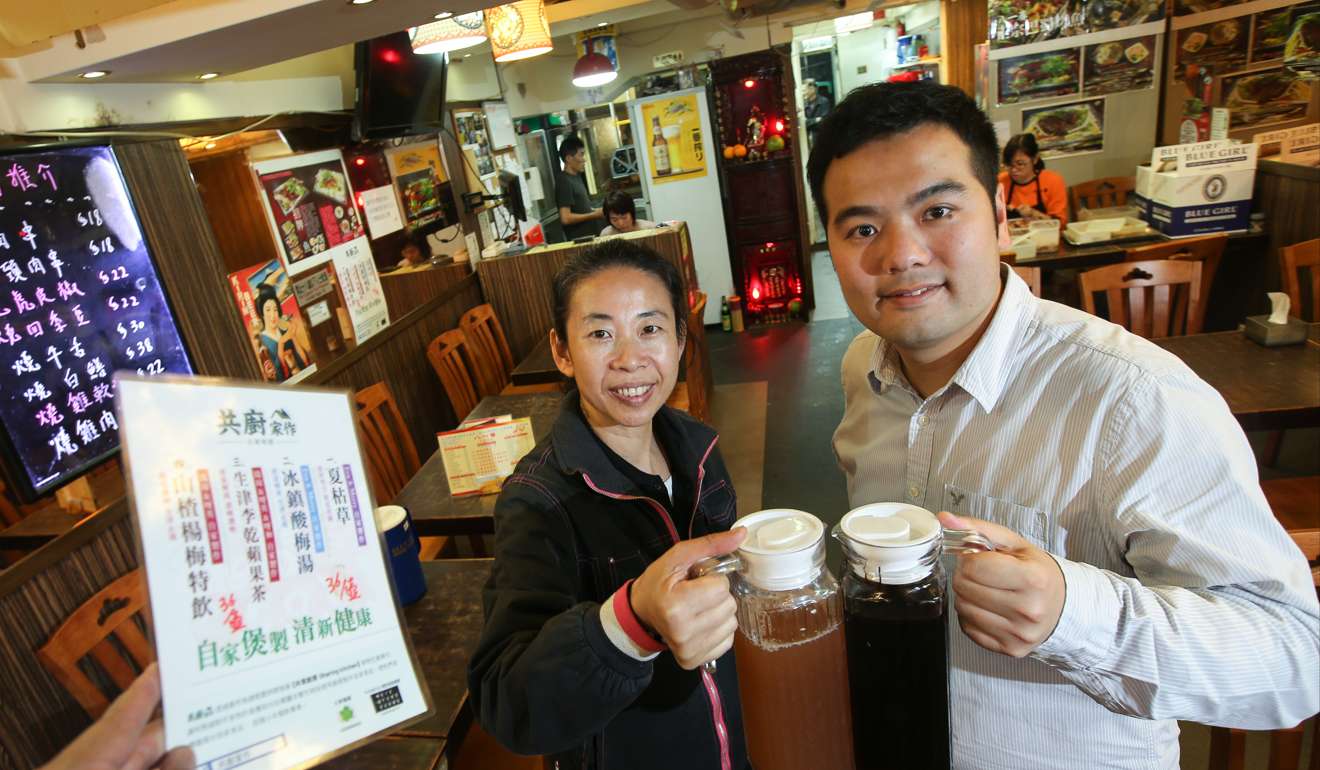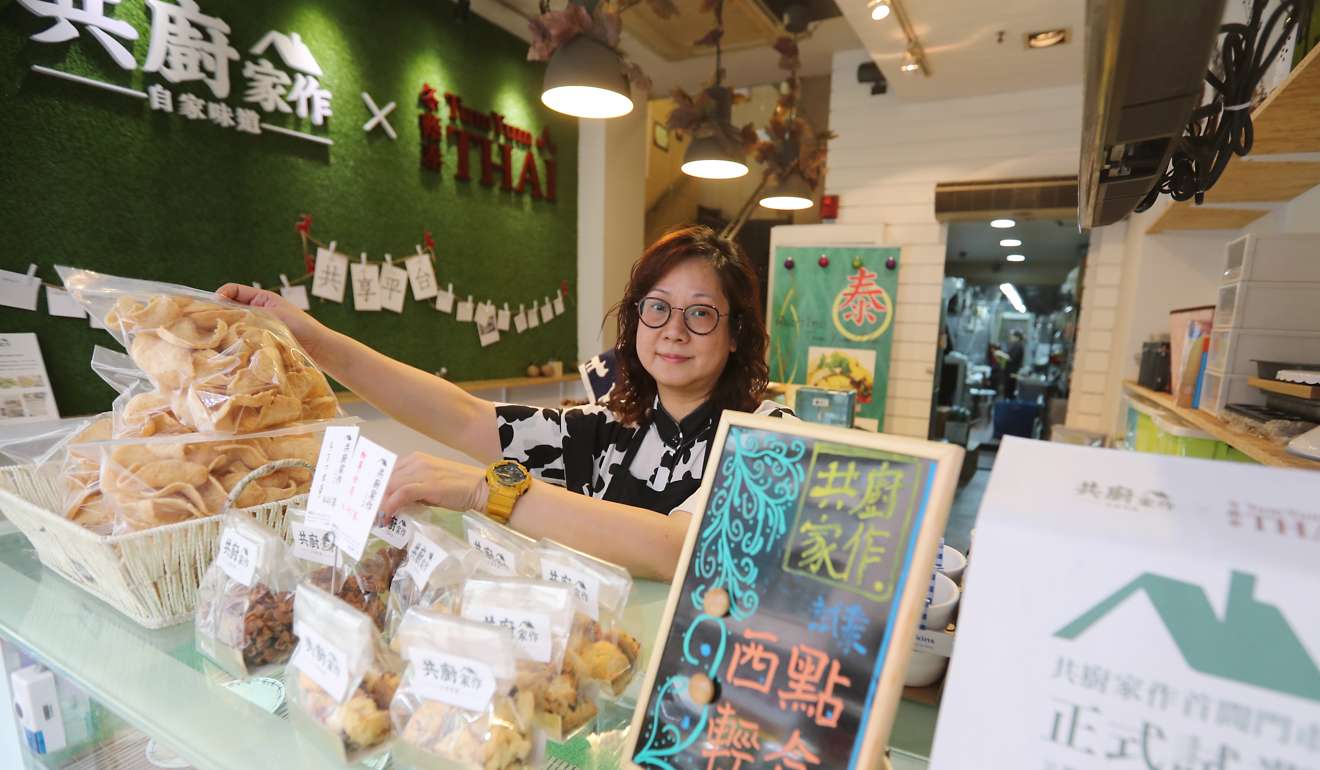
Hong Kong chefs savour project in which they share kitchens of popular restaurants
Venture was founded by a social enterprise in April last year with HK$800,000 from a government-run development fund
Inside a small cafe on a busy street in Cheung Sha Wan there is a continual bustle of people coming and going, but nothing can distract Debbie Yan Ka-oi.
She is completely immersed in preparing her special brownies, and whisks flour with melted chocolate, cocoa powder, eggs and other ingredients in a mixer as a delicious aroma gently wafts through the air.
At slightly over 100 square feet this is her dream factory where she churns out her beloved desserts with the help of an adjacent kitchen – borrowed, free of charge, from a Thai restaurant upstairs called Tum Yum Thai during its daily afternoon break.
When the restaurant is closed from 3pm to 6pm on weekdays, Yan, in her 50s, may freely use the kitchen’s facilities to flex her culinary muscles, defined by the training she received from a veteran patissier in her youth.
Her cafe is in fact owned by the Thai restaurant, but she is allowed to use it rent-free thanks to restaurant bosses who are willing to take part in a “sharing kitchen” project under the concept of a “sharing economy”.
The three-year venture was founded by a social enterprise, the Community Development Enhancement Fund (CDEF), in April last year with HK$800,000 from the government-run Social Innovation and Entrepreneurship Development Fund, which supports start-ups and community projects to alleviate poverty.
It has garnered the support of six restaurant partners that are willing to share their kitchens with underprivileged chefs lined up by project founder and social worker Dodo Cheng Yiu-tung. So far 12 female chefs, either housewives or migrants from the mainland, have been involved in the project.

Cheng, also CDEF chairman, pushed the idea of a “sharing kitchen” a few years ago as he hoped to explore the concept of a “sharing economy” to help the grass roots start their businesses in a harsh economic environment made worse by property hegemony.
“Given the sky-high commercial rents in Hong Kong, the grass-roots dream of starting up their own business only seems too remote to be attained,” he said.
Two years ago it dawned on him that he could make use of the “gap” in the operations of restaurants that either open late at noon or have a break in the afternoon.
“Due to difficulties in hiring enough people to maintain a whole-day operation or concerns about low customer flow during non-peak hours, many restaurants are not able to open for the whole day,” Cheng said.
“A huge amount of restaurant space is literally being wasted daily,” he added, saying such wastage was counterproductive and not cost-efficient to the economy.
Based on available information, the number of licensed restaurants in 2015 stood at more than 9,200. Assuming each one would need to close for three hours a day except on holidays, Cheng believes about 9.5 million business hours are lost every year.
“In other words, economic resources worth about HK$1.57 billion have been wasted every year,” he said.

Cheng realised a “sharing kitchen” would maximise use of kitchen space and provide flexible job opportunities for members of the grass roots to hone their talent and passion, not available in the mainstream job market.
With the money from the development fund, Cheng and his team needed to secure restaurant partners, design the business model of each “sharing kitchen”, match food products and pay the start-up and operational costs of each kitchen, including chef salaries and insurance coverage.
Such salaries account for 70 per cent of operational costs. A total of 40 per cent of net profit goes to chefs, about 20 per cent to the restaurants and the remaining 40 per cent to Cheng’s social enterprise.
“Actually this is a win-win affair for all as the participating chefs will also help stimulate the business of the partnered restaurant with their unique products and service,” he said.

In the case of Yan, besides serving coffee and her special macarons and other desserts, she also needs to sell other Thai snacks at her display corner to promote the restaurant business. The cafe, having opened for just two months, has been able to generate about HK$10,000 in revenue monthly.
Having been a housewife for over a decade, Yan, who is also a part-time cooking instructor at some community centres, never dreamed that she could be her own boss.
Her dream business, which opened last Christmas, has given her a new lease of life. During the three-hour daily session she will cook as many desserts as possible and leave the evening hours in the hands of another worker.
“This is a milestone for me. I am surprised that there are really customers who will visit my cafe again. This lets me know that my products do have a market,” Yan said.
“I used to think that as my children started to grow up, I would become a useless person as getting back into the job market is really hard for a middle-aged woman like me who has quit working for many years.
“Sharing a kitchen can turn something impossible into reality. Before I thought it was impossible to borrow a kitchen from restaurants free of charge. Now I am really amazed at seeing this reality come true.”
Joseph Chan, the boss of Tum Yum Thai, said he and his investors were happy to take part in the venture to provide job opportunities for the grass roots.
The restaurant is also a social enterprise founded by a group of Christians aiming to help struggling Thai women in Hong Kong.
“Actually we couldn’t recruit suitable people to manage the space downstairs so we also offered the space rent-free apart from sharing our kitchen,” Chan said.
“This ‘sharing kitchen’ model can create a lot of possibilities for us, such as making cakes for hosting a birthday party at our restaurant. In fact, the turnover of our Thai snacks has increased several times in just over one month.”
For Cheng, the most difficult part of launching the venture was lobbying restaurant partners. Over the years he approached 22 restaurants but in the end only six gave the nod.
Yaichi Ban Bashu Grill Shop in Tsuen Wan was the first restaurant to give a trial run to the business. and
Another restaurant owner, Cheung Chun-kit, admits he struggled to accept the idea for more than a month when Cheng first approached him in 2015.
“I was concerned about the feasibility of this venture, such as whether our kitchen facilities were suitable for the chefs and whether there would be management or safety issues,” he said.
Eventually he was convinced the project could help a lot of people. “I’ve been in this catering business for many years and I know how hard new migrants and the underprivileged are struggling to make a living, let alone running a business,” Cheung said.
“This venture can allow people at the grass roots to hone their talents and become independent,” he said, adding the rent for his restaurant was HK$80,000 a month, which was unaffordable for most.
Cheung finally agreed to a one-week trial in August 2015 by allowing two middle-aged chefs make herbal and fruit tea at the restaurant kitchen from 7am to 11am each day before the restaurant selling grilled fish opened. The drinks were put on the restaurant menu as orders.
“I think the herbal tea really helps our business because after eating our grilled fish our customers usually feel thirsty and like to have some healthy drinks to cool off the ‘heat’ from the food,” he said.
One chef is Lam Lin-ying, who is in her 40s and has been doing odd jobs at a convenience store and airline catering company. Her home-made recipe for making herbal and fruit tea convinced Cheng that she would be a good fit for the restaurant.
“I enjoy working here. I can be my own boss running this business and create my own products. Nobody has treated me like an employee,” she said.
On a good day, the herbal tea enables her to earn HK$78 per hour, more than double the minimum wage of HK$32.50 an hour.
Cheng hopes that each chef may one day become independent and keep sharing the sharing kitchen concept far and wide.

